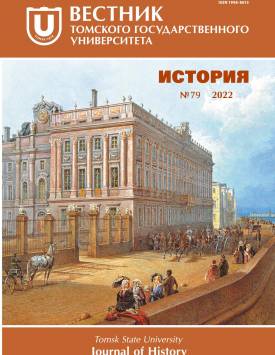The Russian-Swedish war and the French diplomacy in the first years of board of Elizabeth Petrovna (1741-1743)
The history of Russia of the 18th century is unique, as it is the era of the state formation. History of the 18th century poses many problems for the researcher, but also contains the answers to many questions of our time. In particular, this relates to the foreign policy of Russia and its relations with the European states. Russia as a state was formed in regular military conflicts and the expansion of borders at the expense of neighboring territories. Sweden is a neighbour with which bilateral relations have a history of conflict. Throughout the XVIII century, two states regularly fought with each other, starting with the Northern War (1700-1721). Territorial disputes were supplemented by geopolitical contradictions in international relations of the middle of the XVIII century. The aim of the research is to study the role of French diplomacy in the Russian-Swedish war of 1741-1743. The objectives of the study are to identify the relationship between Russian-Swedish and Russian-French diplomatic relations in the middle of the 18th century, to study the course of the Russian-Swedish war of 1741-1743 and trace the evolution of Russian-French relations in the period of 1741-1743. The study is based on the analysis of archival documents from the funds of the Russian State Historical Archive (RGIA) and the Russian State Military Historical Archive (RGVIA). Attention is paid to the study of published sources contained in the collections of the Imperial Russian Historical Society (SIRIO), as well as memoir sources. In addition to documentary materials, the emphasis is on the study of historical literature on the issue. Sweden, weakened by the defeat in the Northern War, continued to claim the role of a regional power. Its policy was determined by the struggle of two parties: “hats” and “caps”, reflecting the interests of France and Russia. In an attempt to capitalize on Russia’s internal political crisis, Sweden declared war in 1741. The bottom line was to distract its neighbor from participating in the parallel pan-European war for the Austrian legacy. Military operations showed that the Swedish army was not able to fight the Russian one. Victories gained by Field Marshal P.P. von Lassi forced the Swedish side to negotiate and conclude the Abo peace in 1743, which confirmed the conditions of Nishtad. French diplomacy made every effort to take advantage of the palace coup in favor of Tsarevna Elizaveta Petrovna in 1741. A “Franco-Prussian party” was formed in Russia, led by Lestock, who played a significant role in the early years of Elizabeth Petrovna’s reign. Despite her love for France, the empress placed the interests of the state above her own. French diplomats were unable to participate in the negotiations in Abo. By 1743, the influence of the "Franco-Prussian party" began to weaken. The policy of Louis XV, the opposite of the geopolitical interests of France and Russia, led to a cooling of bilateral relations, as Russia and France were not ready for a diplomatic union with each other. The authors declare no conflicts of interests.
Keywords
Russia the middle of the XVIII century, the Russian-Swedish war, the Russian-French relations, I.-Zh. T. de La Chetardie, L. D'AlionAuthors
| Name | Organization | |
| Chedurova Elizaveta M. | Gorno-Altai State University | chedurova@mail.ru |
| Kindinov Mikhail A. | Mayminskaya secondary school No. 1 n.a. N.A. Zaborsky | shikotus@mail.ru |
References

The Russian-Swedish war and the French diplomacy in the first years of board of Elizabeth Petrovna (1741-1743) | Tomsk State University Journal of History. 2022. № 79. DOI: 10.17223/19988613/79/15
